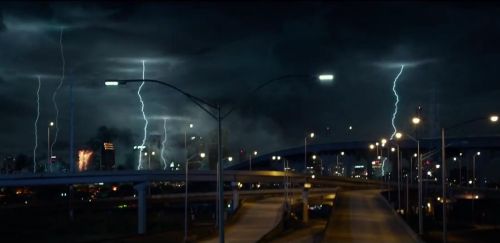Cast: Yusuke Iseya, Kumiko Aso, Akira Terao,
Kanako Higuchi, and Fumiyo Kohinata
Director: Kazuaki Kiriya
125
minutes (15) 2004
Widescreen
ratio 2.35:1
Momentum
Asia DVD Region 2 retail
Rating: 9/10
reviewed
by Christopher Geary
As
a beguiling retro-future, packed to the margins with Jules Verne-inspired
sky-ships, primitive but powerful looking machinery, and clustered elements of
genre-movie set design work (particularly the baroque architecture of Fritz Lang’s
classic Metropolis), the exceedingly
cinematic artistry of Casshern
blends its Japanese sci-fi political melodrama with the iconography of heroic
fantasy adventure. First-time director Kazuaki Kiriya draws upon manga
influences and the animated TV series Shinzo
ningen casshern (1973), known in the west as Robot Hunter, fuses his fashionable art-house pretensions to
blatant pop/ rock-video sensibilities, and eagerly polishes this big-screen
debut’s frequently vigorous live action scenes with gorgeous cinematography and
much visually striking photo-real animation.
Indeed,
the movie’s prominent colour schema flits dazzlingly between harshly urban ‘monochrome’
sumptuous tinted flashbacks and the positively lurid primaries of a
military-industrial ‘present’ where the imaginative back-story offers us a
splendid celebration of alternative-history SF, comparable to Sky Captain And The World Of Tomorrow,
yet without that adventure’s rampant optimism.
Tetsuya
(Yusuke Iseya) is the angry young man that defies his upper-class parents’ wishes
and goes off to war, leaving behind luminous beauty Luna (Kumiko Aso). When
Tetsuya is killed on the front-line, he’s re-animated - while his ‘ghost’ hovers
in the background - by the well-meaning yet morally corruptible Prof Azuma
(Akira Terao), using an untested experimental bio-tech. This ‘neo-cell’ soup
also gives rise to a band of freaky Frankenstein-esque mutants led, and driven
to maniacal vengeance, by the ranting hysteria of chief bad guy Burai (Toshiaki
Karasawa), who promptly escapes to raise an army of robots and intends to stage
a coup against the brutally oppressive military-industrial regime. Only the
cyber-armoured Tetsuya, taking on the mantle of legendary hero ‘Casshern’,
stands any chance of defeating Burai’s mechanoid hordes and superhuman
followers...
Despite
the wonderfully dark, glossy-gloom imagery, the unhurried pace of early ‘chapters’
in this picture’s story-line may test the patience of some viewers. However, if
you can get through a multitude of establishing scenes in the first hour, what
follows is a sequence of astonishingly fast-moving comic-book superhero
fighting, and some startlingly tragic developments for the characters and their
relationships with others (on either side of the muddled conflict). In the end,
you will either love or hate the movie’s reliance on style over content for its
entertainment value. I thought it was vivid in its action sequences and
admirable in its painterly ‘tech noir’ tableaux. Casshern is a movie to be seen and heard, but not necessarily
understood in terms of plot, characters, or its mixed bag of genre themes. It
runs the gamut of unguarded human emotions from love and rage to expressions of
regret and forgiveness, though its sense of poignancy is determined largely by
the individual viewer’s responses to the evocative digital-simulations of life,
afterlife, rebirth, and death. In those terms, and in spite of its narrative
flaws, Casshern is ‘pure cinema’ par
excellence, and it gets my vote for SF picture of the year, so far!
The
second disc of special features in this DVD package is comprised of subtitled
interview clips, 11 deleted scenes with director’s commentary, some 8mm footage
- that includes flashbacks to Tetsuya’s childhood, plus a couple of trailers.
There’s not much in this clutch of typical extras that’s making an essential
contribution to the filmic project or enhancing its production, but I think it
is halfway amusing to try and figure out who’s who in the (un-captioned) video
and publicity interviews - as at least a couple of the cast are hard to recognise out of
make-up and costumes.





























